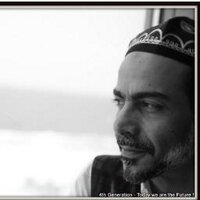3eani
 |
|
Definitions
created on September 28, 2012
Mercy of Mohammad PBUH is greater then that of a mom to her child
ISHQ (Extreme limitless unconditional LOVE ) is a religious duty towards Mohammad
created on September 27, 2012
Usury ?????
Is equal to waging a war against the almighty Allah and his prophet and last messenger Mohammad SAWS PBUH ??? ???? ???? ???? ??? ????
created on September 27, 2012
What Muslims are prohibited to do .
Clear Limited List for the individual and as a collective group
created on September 27, 2012
????????: ???? ????????? ????? ?? ???? ??? ???? ???? ??? ??? ???????? ???????http://*** ?
? ??? ??????? ????? ???????? ??? ??? ???? ????
????? ???? ???? ?????? ? ,??? ??? ???? ???? ?????? ?? ?@3eani? ?@1001am?
#almanarnews #Haram
created on September 21, 2012
Peace be upon him is a phrase that practising Muslims often say after saying (or hearing) the name of one of the Prophets of Islam.
There are three variants of this phrase in Arabic:
"Peace be upon him": (Arabic: ???? ??????? ?alayhi s-sal?m - A.S.) - this expression follows after naming any prophet other than Muhammad, or one of the archangels (i.e. Jibreel, Mikaeel, etc.)
"May Allah pray on him and grant him peace.": (Arabic: ??? ???? ???? ????? ?all All?hu ?alay-hi wa-sallam - S.A.W., SAAW, or SAAS) - this expression follows specifically after saying the name of the last prophet of Islam, Muhammad.
"May Allah grant peace and pray on him and his family.": (Arabic: ??? ???? ???? ????? ?all Allahu ?alayhi wa-??lih - S.A.W.W.) - this expression follows specifically after saying the name of the last prophet of Islam,
In Arabic these salutations are called ?alaw?t, and are abbreviated by some with the use of SAW (in accordance with the Arabic words sallallahu alayhi wasallam) or PBUH (which stands for Peace be upon him in English). However, this practice is considered to be controversial among senior Islamic scholars who disagree with this use on the basis that it demonstrates a lack of respect and laziness.[1][2][3]
The phrase is also encoded as a ligature at Unicode codepoint U+FDFA
created on September 21, 2012
The sunnah of Muhammad includes his specific words, habits, practices, and silent approvals:[2] it is significant because it addresses ways of life dealing with friends, family and government.[2] Recording sunnah was an Arabian tradition and, once people converted to Islam, they brought this custom to their religion.[3] The sunnah is consulted after referring to the Qur'an, if the issue is not addressed there. The term "Sunni" denotes those who claim to practice these usages, as part of the Ummah.
created on September 21, 2012
Praise
Durood ? Na'at ? Mawlid ? Ha?ra ? Madih nabawi ?
Ya Muhammad ?
created on September 21, 2012
Hadith Qudsi
Hadith Qudsi (or Sacred Hadith) is a sub-category of hadith which are sayings of Muhammad. Muslims regard the Hadith Qudsi as the words of God (Arabic: Allah), repeated by Muhammad and recorded on the condition of an isnad. According to as-Sayyid ash-Sharif al-Jurjani, the Hadith Qudsi differ from the Quran in that the former are "expressed in Muhammad's words", whereas the latter are the "direct words of God
created on September 21, 2012
What ever was reported that Prophet Mohammad peace be upon him said by his Sahaba not only that relating to the teachings of Islam
A ?ad?th (Arabic: ?????, play /?h?d??/[1] or /h???di??/[2]) (plural: hadith, hadiths, or a??d?th) is a saying ascribed either validly or invalidly to the Islamic prophet Muhammad

